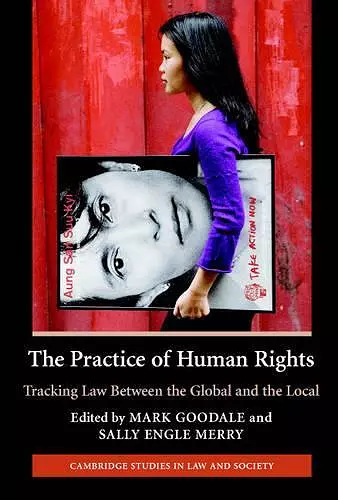The Practice of Human Rights
Tracking Law between the Global and the Local
Mark Goodale editor Sally Engle Merry editor
Format:Paperback
Publisher:Cambridge University Press
Published:26th Jul '07
Currently unavailable, and unfortunately no date known when it will be back
This paperback is available in another edition too:
- Hardback£70.00(9780521865173)

Using ethnographic case studies, this is aimed at courses globally in social sciences and law.
Human rights offer the prevailing global approach to social justice, but how they work is far less clear. Through ethnographic case studies in Latin America, Africa, and Asia, this volume of essays by leading scholars offers a rich and varied overview of human rights in practice.Human rights are now the dominant approach to social justice globally. But how do human rights work? What do they do? Drawing on anthropological studies of human rights work from around the world, this book examines human rights in practice. It shows how groups and organizations mobilize human rights language in a variety of local settings, often differently from those imagined by human rights law itself. The case studies reveal the contradictions and ambiguities of human rights approaches to various forms of violence. They show that this openness is not a failure of universal human rights as a coherent legal or ethical framework but an essential element in the development of living and organic ideas of human rights in context. Studying human rights in practice means examining the channels of communication and institutional structures that mediate between global ideas and local situations. Suitable for use on inter-disciplinary courses globally.
'This collection makes a compelling case for human rights as a new focus of anthropological research, evidence of a discipline in lively transition. Even more fundamentally, the range of projects and commitments expressed in the essays point to key locations - at once political, ethical, and experiential - in the new legal geography of globalism, as the contributors map the uneven horizons and pathways along which human rights are today asserted, defended, and contested.' Carol Greenhouse, Professor of Anthropology, Princeton University
'A compelling book. The anthropologists here are also interdisciplinarists. The reconfiguration of institutions, resistance movements and everyday expectations brought about by the very idea of human rights demands a reconfiguring of approaches from the social observer. The authors shrink from neither the questions nor the answers thrown up by human rights efforts in practice. By focusing on issues of violence, power, vulnerability and people's ambivalence, they offer insights that mould a new kind of realism.' Marilyn Strathern, William Wyse Professor of Social Anthropology, University of Cambridge
''Human rights' has become one of the key ideas of contemporary world-making. This book places it in an open intellectual landscape, where well-informed scholars come together to engage in close scrutiny of its translation into political and legal practice, in a wide range of settings from the Chiapas of the Zapatistas to the Myanmar of the military junta. Their global reach and theoretical sophistication contribute impressively to the vitality of the idea itself, and to the growth of understanding of its uses.' Ulf Hannerz, Stockholm University
'In the present publication, the short introductions at the beginning of each section provide focus by summarizing how anthropologists have previously worked with the addressed themes. Simultaneously they also provide orientation for future research by demarking research gaps and pointing out theoretical inconsistencies.' Suomen Antropologi: Journal of the Finnish Anthropological Society
ISBN: 9780521683784
Dimensions: 230mm x 153mm x 25mm
Weight: 648g
398 pages